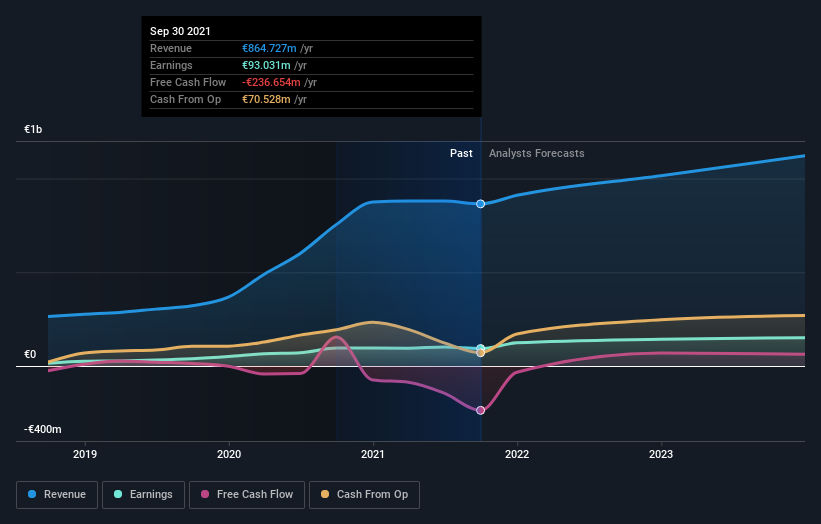
While Varta AG (ETR:VAR1) might not be the most widely known stock at the moment, it saw significant share price movement during recent months on the XTRA, rising to highs of €135 and falling to the lows of €108. Some share price movements can give investors a better opportunity to enter into the stock, and potentially buy at a lower price. A question to answer is whether Varta's current trading price of €111 reflective of the actual value of the mid-cap? Or is it currently undervalued, providing us with the opportunity to buy? Let’s take a look at Varta’s outlook and value based on the most recent financial data to see if there are any catalysts for a price change.
See our latest analysis for Varta
Is Varta still cheap?
The share price seems sensible at the moment according to my price multiple model, where I compare the company's price-to-earnings ratio to the industry average. I’ve used the price-to-earnings ratio in this instance because there’s not enough visibility to forecast its cash flows. The stock’s ratio of 48.16x is currently trading in-line with its industry peers’ ratio, which means if you buy Varta today, you’d be paying a relatively sensible price for it. Although, there may be an opportunity to buy in the future. This is because Varta’s beta (a measure of share price volatility) is high, meaning its price movements will be exaggerated relative to the rest of the market. If the market is bearish, the company’s shares will likely fall by more than the rest of the market, providing a prime buying opportunity.
Can we expect growth from Varta?

Future outlook is an important aspect when you’re looking at buying a stock, especially if you are an investor looking for growth in your portfolio. Although value investors would argue that it’s the intrinsic value relative to the price that matter the most, a more compelling investment thesis would be high growth potential at a cheap price. Varta's earnings over the next few years are expected to increase by 60%, indicating a highly optimistic future ahead. This should lead to more robust cash flows, feeding into a higher share value.
What this means for you:
Are you a shareholder? It seems like the market has already priced in VAR1’s positive outlook, with shares trading around industry price multiples. However, there are also other important factors which we haven’t considered today, such as the financial strength of the company. Have these factors changed since the last time you looked at VAR1? Will you have enough confidence to invest in the company should the price drop below the industry PE ratio?
Are you a potential investor? If you’ve been keeping tabs on VAR1, now may not be the most optimal time to buy, given it is trading around industry price multiples. However, the optimistic forecast is encouraging for VAR1, which means it’s worth diving deeper into other factors such as the strength of its balance sheet, in order to take advantage of the next price drop.
If you want to dive deeper into Varta, you'd also look into what risks it is currently facing. To that end, you should learn about the 2 warning signs we've spotted with Varta (including 1 which is a bit unpleasant).
If you are no longer interested in Varta, you can use our free platform to see our list of over 50 other stocks with a high growth potential.
If you're looking to trade Varta, open an account with the lowest-cost platform trusted by professionals, Interactive Brokers.
With clients in over 200 countries and territories, and access to 160 markets, IBKR lets you trade stocks, options, futures, forex, bonds and funds from a single integrated account.
Enjoy no hidden fees, no account minimums, and FX conversion rates as low as 0.03%, far better than what most brokers offer.
Sponsored ContentNew: Manage All Your Stock Portfolios in One Place
We've created the ultimate portfolio companion for stock investors, and it's free.
• Connect an unlimited number of Portfolios and see your total in one currency
• Be alerted to new Warning Signs or Risks via email or mobile
• Track the Fair Value of your stocks
Have feedback on this article? Concerned about the content? Get in touch with us directly. Alternatively, email editorial-team (at) simplywallst.com.
This article by Simply Wall St is general in nature. We provide commentary based on historical data and analyst forecasts only using an unbiased methodology and our articles are not intended to be financial advice. It does not constitute a recommendation to buy or sell any stock, and does not take account of your objectives, or your financial situation. We aim to bring you long-term focused analysis driven by fundamental data. Note that our analysis may not factor in the latest price-sensitive company announcements or qualitative material. Simply Wall St has no position in any stocks mentioned.
About XTRA:VAR1
Varta
Through its subsidiaries, engages in the research, development, production, and sale of micro and household batteries, large-format batteries, battery solutions, and energy storage systems in Europe, Asia, North America, and internationally.
Undervalued low.
Similar Companies
Market Insights
Community Narratives



